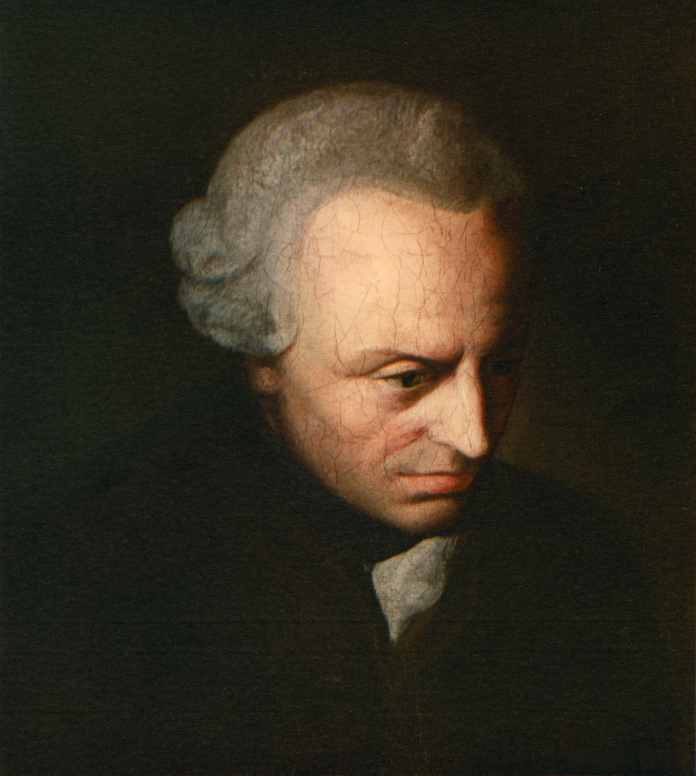Immanuel Kant (1724–1804, rhymes with “want”) is the single most influential philosopher in history, even though many have probably never heard of him. How we think of ourselves and how we think about how we perceive the world is from Kant’s philosophy. With the strife of the 21st century revealing itself more by the day, Kant is becoming increasingly more important in helping us to navigate it. The following is a mere morsal as to how.
Anyone who has attempted to read and digest The Critique of Pure Reason (1781) will know that it is not easy. In fact, it is very hard indeed. For many, it is probably best to rely on scholars who have read it for us and then given their time to explaining what lies within. From what has become known as Kant’s Copernican Revolution to Kant’s Categorical Imperative, we are given a solid foundation in which to build our knowledge and understanding of human reality. I use the term ‘human reality’ advisedly, as Kant himself would. We cannot begin to see reality through the senses of any other species. Only our own. And that is a huge challenge in itself.
How, therefore, can we summarise one of the most important aspects of Kant’s contributions to 21st-century thought, what has become known as Kant’s Copernican Revolution?
Why a Copernican comparison?
Nicholas Copernicus was a Polish astronomer and mathematician known as the father of modern astronomy. He was the first European scientist to propose that Earth and other planets revolve around the sun, the heliocentric theory of the solar system. Up until this point, humans believed the sun travelled around the Earth and that the Earth was at the centre. By being counterintuitive (something Kant considered vital to all reasoning), Copernicus was able to reveal to humanity that their long-held notions were wrong.
Before Kant, the Enlightenment had decried that human reason, rationalism, and empirical observation were the only means of knowledge. Humankind was the centre of what could be known. Kant, in his Critique of Pure Reason, upset this worldview.
Kant revolutionised philosophy. Kant showed that the mind, through its innate categories, constructs our experience along certain lines (space, time, causality, self, etc.). Thus, thinking and experiencing give no access to things as they really are. We can think as hard as we like, but we will never escape the innate constraints of our minds. Kant forced philosophy to look seriously at the world for the agent (what Kant calls the phenomenal world) independently of the real world outside consciousness – the world in itself (the noumenal world).
The phenomenal world is the world as it appears to human beings as a result of being structured by human understanding (for example, the concepts of freedom, love, etc.) – the world as experienced, as opposed to the world of things-in-themselves.
The first world is called the noumenal world. It is the world of things outside us, the world of things as they really are, the world of trees, dogs, cars, houses and fluff that are really real. However, Kant says, our minds are created in such a way that we cannot comprehend this world as it really is.
Another essential aspect of Kantian thought is the Categorical Imperative. This is also crucial to how we live our lives in the 21st century.
The categorical imperative is a moral principle that asks us to act only according to rules that we would want everyone to follow universally. Unlike practical advice that depends on personal goals or situations, it is an unconditional command. For example, if you’re considering lying, the categorical imperative asks, “Would it be okay if everyone lied all the time?” If not, then lying is morally wrong. It’s about treating people as valuable in themselves, not just as tools to achieve something, and ensuring our actions could logically apply to everyone without causing contradictions or harm.
In summary, Immanuel Kant remains profoundly important in the 21st century due to his enduring influence on modern philosophy, ethics, and political thought. His moral philosophy, particularly the concept of the categorical imperative, continues to shape contemporary debates on human rights, justice, and the responsibilities of individuals in society. Kant’s insistence on treating individuals as ends in themselves rather than as means to an end underpins much of today’s ethical discourse, from bioethics to artificial intelligence. His work laid the foundations for deontological ethics, which contrasts sharply with utilitarian approaches, offering a framework that prioritises moral duty over consequential outcomes.
Kant’s impact also extends to epistemology and the philosophy of science, where his Critique of Pure Reason fundamentally changed how we understand the relationship between knowledge and experience. In a world increasingly shaped by technology and data, his idea that we actively structure experience through innate concepts remains highly relevant. Moreover, Kant’s vision of perpetual peace and cosmopolitanism offers vital insights for global politics, advocating for international cooperation and the moral dignity of all individuals. As global challenges grow more complex, Kant’s commitment to reason, autonomy, and universal principles provides a compelling guide for navigating ethical and political dilemmas in our time.







